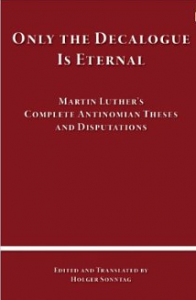
What does Martin Luther have to say about the inner-life of the Christian? Newly translated comments on Bible texts for every day of the year are now being made available free of charge by Lutheran Press. Simply “like” Lutheran Press on Facebook to receive Luther’s intriguing insights daily.
Lutheran Press, started by pastors Paul Strawn (full disclosure: he is my pastor) and Holger Sonntag, is the publishing house that translated into English Martin Luther’s Antinomian Disputations. Some of the excerpts from the daily devotions are also not available elsewhere in English.
Here are some of my favorite samples from the past couple weeks:
From Dec. 16:
“Since the time we have stopped offering burnt offerings and drink offerings to the queen of heaven, we have lacked everything.”– Jeremiah 44:18
When God’s Word arose, a famine arose with it. For example, at the time of Abraham (Gen. 12:10), Isaac (Gen. 26:1), Jacob, Joseph (Gen. 42:5; 43:1), Elijah (1 Kings 18:2), and Elisha (2 Kings 4:38) there were severe famines while the light of truth shone brightly. And when the gospel took its beginning, there was a great famine throughout the whole world, Acts 11:28. This obviously must be the fault of the dear gospel and Word of God, and not the world’s previous misdeeds and current hardened ingratitude. Accordingly, the Jews blamed all their misfortunes on Jeremiah’s teaching, Jer. 44:15-19. And the Romans, when they had been destroyed by the Goths, could not help but blame their defeat on the fact that they had become Christians. But let them do what they always do. The world is the world. Just as those became liars and perished, so these too shall become liars and perish so that nonetheless Christ and his Word remain. There he sits at the right hand of God. Let him who so desires and is evil tear him down from his throne. But while Christ remains there, we also will remain. That’s a fact. (Vol. 5, Jena edition, p. 179)
From Dec. 15:
“If they called the father of the household Beelzebub, how much more will they call the members of the household this name!”– Matthew 10:25
When the world calls you a heretic, deceiver, liar, and rebel, this is a good sign that you are a decent man and similar to your Lord Christ. For he had to be just those things and be condemned and crucified with the murderers. What would it matter to me as a preacher, if the world called me a devil, when I know that God calls me his angel? Let the world call me a deceiver for as long as it desires. Meanwhile, God calls me his faithful attendant and his household servant. The angels call me their coworker. The saints call me their brother. The believers call me their father. The wretched souls call me their savior. The ignorant call me their light. And God says: “Yes, it shall be so,” and so do the angels with all creatures. How handsomely the world, along with the devil, deceived me with its reviling and abuse. What great victory it won over me. What great damage it inflicted on me, the dear world. (Vol. 5, Jena edition, p. 176a)

From Dec. 5:
“Your will be done on earth as in heaven.” (Matthew 6:10)
If a good will were in us, we would not need this prayer. Therefore, let us examine ourselves, so we do not do what we want to do and instead do what we do not want to do and thus always act against our will. For we all have to confess that our will is never good, no matter how pretty it may appear, unless it is coerced and driven to the point that it gives up. And in this way let us strive to gain a superior will that overcomes our own will and not to be uncertain. For, when we find that there is only one will in us, and not two wills set against one another, let us in this way get accustomed to follow the superior will against our own will. … After all, even Christ’s will had to cease, even though it was without a doubt good – it was, in fact, the very best will of all that have ever been – so that the divine will would be done [cf. Lk. 22:42]. Why, then, do we poor worms take pride in our will although it is never without evil and always worthy to be thwarted? (Luther, vol. I, Jena edition, on the Lord’s Prayer)
Regarding this last one, as Paul Strawn says, it is important because of the topic it involves: the very real fight between the Old Adam and the New Man, what it signifies, and how it, at times, resolves. The point here is that if we find one will within, it should be that which we fight against. In other words, the tension between the Old Adam and New Man is normal, but the will of the New Man should win out. The rest of the context makes it clear the superior will is not Christ’s will, but the will of the Christian who is united to Christ (AE vol, 42).
I hope you will take time to dive into Luther’s Bible Treasures, complements of Lutheran Press!











